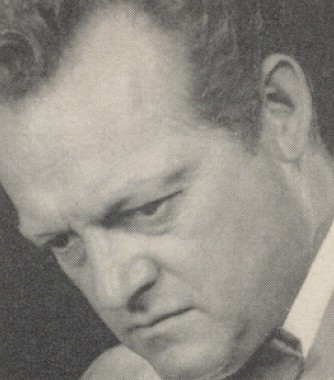
Henry Krips
p, 1912-1987 AT
Musician / Composer / Conductor of Classical
A.k.a. Heinrich Josef Krips
Austrian-Australian conductor, composer and pianist, born 10 February 1912 in Vienna, died 25 January 1987 in Adelaide. From the Australian dictionary of Biography: Educated at the Vienna Conservatory of Music and Vienna University, he made his conducting début at the city’s Burgtheater in 1932. Further appointments followed at Innsbruck and Salzburg, at the Vienna Volksoper and at open-air festivals. He also composed an opera, Fiordaliso (1936). Although Krips’s parents were both Catholic, he had Jewish ancestry. On 3 September 1938 in Vienna he married Luise Pauline Deutsch; they migrated to Australia, arriving in Sydney in November. Now calling himself Henry, Krips soon found work in the music industry. He composed and directed the scores for several Australian films, including Gone to the Dogs (1939), Come up Smiling (1939), Dad Rudd, M.P. (1940) and The Power and the Glory (1941). For the Kirsova Ballet, he wrote the music for Faust (1941) and The Revolution of the Umbrellas (1943) and provided piano accompaniment for performances. In 1942-43 he was employed as musical director with George Patterson Pty Ltd’s radio unit. He was naturalised on 10 July 1944. That year he conducted the Australian Broadcasting Commission’s Sydney Symphony Orchestra during the opera season presented by the newly formed Krips-de Vries Grand Opera Company. In 1946-48 Krips conducted the Sydney Symphony Orchestra, and the Sydney Light Symphony Orchestra at its Music for Millions concerts. He was appointed conductor of the Perth Symphony Orchestra in 1948. Described by a critic, Raymond Bowers, as a `powerhouse of enthusiasm’, he promised to perform `Mahler, Britten, Bax, Bruckner, a pageant of composers known only to Perth from recordings and hearsay’. He wrote the music for the films Smithy (1946) and Charles Chauvel’s epic Sons of Matthew (1949). In 1949 Krips became resident conductor of the newly constituted South Australian Symphony Orchestra. Over the following years, with his customary energy and enthusiasm, he raised it to a very high standard. He also performed as guest-conductor in other States. Six ft tall, with fair hair and blue eyes, he was a charming personality, both on and off the concert platform. He wrote music, winning prizes for several compositions: Land of Mine, a national song (1951); Southern Intermezzo, a piece for the saxophone (1956); and Kirribilli, a light orchestral composition (1959). In 1953 he took leave for nine months to study trends in music in Britain and Europe, and to conduct orchestras in Vienna and London. Further leave was granted in 1955 and 1957; eventually Krips spent a part of each year overseas, where he conducted many leading British and European orchestras at concerts, operas and recording sessions. He developed his skills and reputation as a conductor and took back to Australia orchestral works that had never been performed there before. Credited with introducing Australian audiences to Mahler, in 1963 he was awarded honorary membership of the International Gustav Mahler Society, Vienna. In 1967 the president of Austria conferred on him the title of professor `in recognition of his outstanding work for Austrian music in Australia’. He was appointed MBE in 1970. After retiring in March 1972, Krips continued to work as a guest-conductor in Australia and overseas, making appearances in Korea (1978) and Canada (1979).
Genres
Popular Tracks 

Track list and 30sec audio provided by ![]()
Discography
| Title | Artist | Year | Type |
|---|---|---|---|
| 6 Overtures | Franz von Suppé, The Philharmonic Promenade Orchestra Of London, Henry Krips | 1989 | Album |
| Wiener Schnitzel | Philharmonia Orchestra Conducted By Henry Krips | 1975 | Album |
| Overtures | Franz von Suppé / Henry Krips / Philharmonia Promenade Orchestra | 1965 | Album |
| Johann Straus Favourites | Henry Krips | 1961 | Album |
| Johann Strauss Favorites | Johann Strauss Jr., Philharmonia Promenade Orchestra, Henry Krips | 1961 | Album |
| The Irresistible Mr. Strauss | Johann Strauss Jr. - Philharmonia Promenade Orchestra Conducted By Henry Krips | 1960 | Album |
| Viennese Dances Volume 1 | Henry Krips | 1959 | Album |
| Viennese Dances Volume 2 | Henry Krips | 1959 | Album |
| Viennese Waltzes | Henry Krips | 1959 | Single |
| Waldteufel Waltzes | Emil Waldteufel, Philharmonia Promenade Orchestra, Henry Krips | 1957 | Album |
| Poète Et Paysan, Cavalerie Légère, España, Les Patineurs | Emil Waldteufel / Franz von Suppé, Philharmonia Promenade Orchestra, Henry Krips | Album | |
| Wiener Schnitzel | Henry Krips | Album | |
| Weense Walsen | Philharmonia Orchestra olv Henry Krips | Album | |
| Concert Waltzes | Henry Krips | Album | |
| Waldteufel Waltzes | Henry Krips | Single | |
| Wiennese Waltzes | Willi Boskovsky And Henry Krips | Album | |
| Waldteufel Walsen | Emil Waldteufel, Philharmonia Promenade Orchestra, Henry Krips | Album | |
| Light Cavalry Overture | Henry Krips | Single |
ArtistInfo App
ArtistInfo for iOS and ArtistInfo for Mac are presenting musicians, composers and producers that are envolved in the musical work that you are listening to in Apple Music, iTunes, or Spotify. Discover new music via the network among artists. Manage your favorite musicians and albums via iCloud and share recommendations with your friends via email, AirDrop, or Social Media.Acknowledgements
To all the music fans that are contributing on Discogs, MusicBrainz and Wikipedia. Thanks to Franz Flückiger for providing Storygram used to visualize band membership.Other Search Results
| Henry Krips bvoc, b |